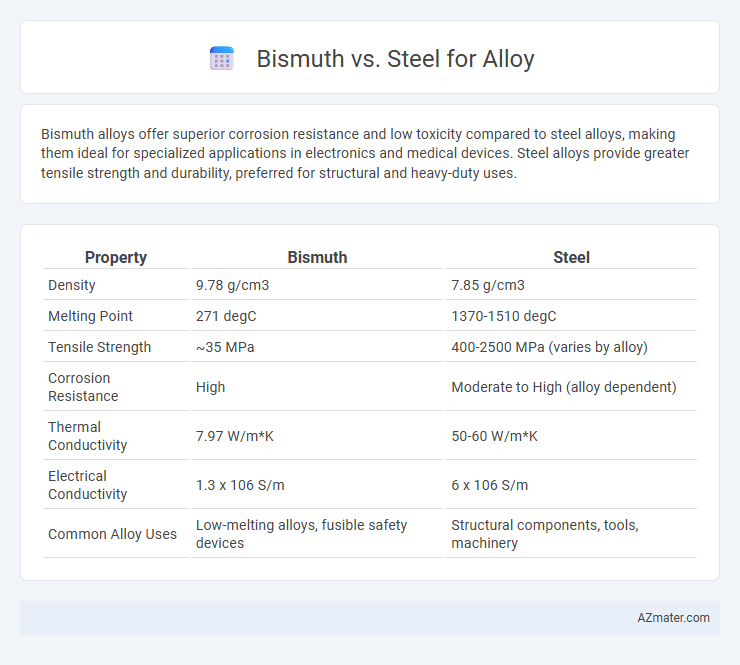Bismuth alloys offer superior corrosion resistance and low toxicity compared to steel alloys, making them ideal for specialized applications in electronics and medical devices. Steel alloys provide greater tensile strength and durability, preferred for structural and heavy-duty uses.
Table of Comparison
| Property | Bismuth | Steel |
|---|---|---|
| Density | 9.78 g/cm3 | 7.85 g/cm3 |
| Melting Point | 271 degC | 1370-1510 degC |
| Tensile Strength | ~35 MPa | 400-2500 MPa (varies by alloy) |
| Corrosion Resistance | High | Moderate to High (alloy dependent) |
| Thermal Conductivity | 7.97 W/m*K | 50-60 W/m*K |
| Electrical Conductivity | 1.3 x 106 S/m | 6 x 106 S/m |
| Common Alloy Uses | Low-melting alloys, fusible safety devices | Structural components, tools, machinery |
Introduction to Bismuth and Steel Alloys
Bismuth alloys are prized for their low toxicity, high density, and excellent machinability, making them ideal for lead-free applications and specialized casting processes. Steel alloys, composed primarily of iron and carbon, offer superior strength, durability, and corrosion resistance, widely used in construction, automotive, and industrial sectors. The distinct physical and chemical properties of bismuth and steel alloys make them suitable for vastly different industrial applications, with bismuth serving niche roles where environmental safety and precision are critical.
Chemical Composition and Elemental Properties
Bismuth alloys contain a high percentage of bismuth, typically above 50%, combined with elements like tin, lead, or cadmium to exploit its low melting point and density, whereas steel primarily consists of iron with carbon content usually below 2%, enhanced by elements such as chromium or nickel for strength and corrosion resistance. Bismuth's elemental properties--non-magnetic, low toxicity, and high thermal expansion--contrast sharply with steel's magnetic nature, high tensile strength, and significant hardness. These differences in chemical composition and elemental characteristics dictate the distinct applications of bismuth alloys in low-temperature environments and steel in structural and high-stress scenarios.
Mechanical Strength and Durability Comparison
Bismuth alloys exhibit lower mechanical strength and reduced durability compared to steel alloys, making steel preferable for high-stress applications. Steel's superior tensile strength, hardness, and resistance to wear and fatigue ensure long-term performance in structural and industrial uses. While bismuth alloys offer advantages like low toxicity and thermal conductivity, their brittleness limits their use in mechanically demanding environments.
Corrosion Resistance: Bismuth vs Steel
Bismuth exhibits superior corrosion resistance compared to steel, as it forms a stable oxide layer that prevents further oxidation and degradation, making it highly resistant to acids and water exposure. Steel tends to corrode when exposed to moisture and oxygen, forming rust that weakens the metal unless it is alloyed with corrosion-resistant elements or coated. In applications requiring high corrosion resistance, bismuth alloys outperform standard steel, especially in acidic or marine environments.
Thermal and Electrical Conductivity Differences
Bismuth exhibits significantly lower thermal conductivity, approximately 8 W/m*K, compared to steel's range of 15-50 W/m*K, making it less efficient for heat dissipation in alloys. Electrically, bismuth has a high electrical resistivity around 1.3 x 10^-6 O*m, contrasting sharply with steel's lower resistivity of approximately 1 x 10^-7 O*m, affecting alloy performance in conductive applications. These differences influence the suitability of bismuth-steel alloys in thermal management and electrical conductivity-dependent industries.
Environmental Impact and Sustainability
Bismuth-based alloys offer lower environmental impact compared to steel alloys due to their non-toxic nature and higher recyclability, reducing hazardous waste and pollution. Steel production is energy-intensive and generates significant carbon emissions, contributing to climate change and resource depletion. Incorporating bismuth in alloys supports sustainable manufacturing by decreasing reliance on heavy metals and lowering overall ecological footprint.
Industrial and Commercial Applications
Bismuth alloys are favored in industrial applications for their low toxicity, excellent machinability, and unique physical properties such as low melting points and high density, making them ideal for precision casting, fire detection devices, and environmentally friendly solders. Steel alloys dominate commercial and heavy industry sectors due to their superior mechanical strength, durability, and versatility, essential for construction, automotive manufacturing, and heavy machinery. The choice between bismuth and steel alloys depends on application-specific requirements including corrosion resistance, thermal conductivity, and environmental impact considerations.
Manufacturing Processes and Workability
Bismuth alloys offer superior machinability and low melting points, making them ideal for casting and precision manufacturing processes, especially in applications requiring minimal thermal distortion. Steel alloys, by contrast, provide greater strength and durability but require higher processing temperatures and more intensive workability techniques such as forging and heat treatment. The choice between bismuth and steel alloys depends largely on the specific manufacturing requirements, balancing ease of fabrication against mechanical performance.
Cost and Market Availability
Bismuth alloys typically cost more than steel alloys due to limited production and specialized applications, while steel benefits from large-scale manufacturing and widespread availability, resulting in lower prices. Steel alloys dominate global markets owing to their affordability, high tensile strength, and extensive use in construction and automotive industries. Bismuth's niche use in low-melting-point alloys and environmentally friendly applications limits its market presence compared to the robust supply chain of steel alloys.
Choosing the Right Alloy: Key Considerations
Choosing the right alloy between bismuth and steel depends on the application's thermal conductivity, corrosion resistance, and mechanical strength requirements. Bismuth alloys offer low toxicity, excellent machinability, and melt at low temperatures, making them ideal for precision casting and electrical fuses. Steel alloys provide superior tensile strength, durability, and wear resistance for structural applications and heavy-duty machinery.

Infographic: Bismuth vs Steel for Alloy
 azmater.com
azmater.com